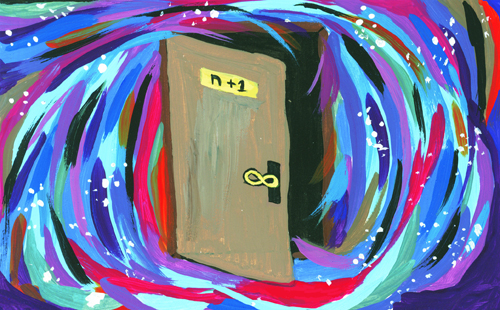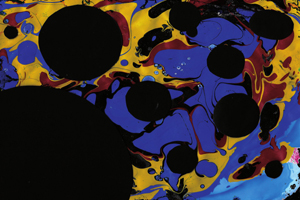
Your complimentary articles
You’ve read one of your four complimentary articles for this month.
You can read four articles free per month. To have complete access to the thousands of philosophy articles on this site, please
Articles
To Infinity… and Beyond!
Owain Griffin takes a leap beyond the limits of numbers, into concepts.
Ayone who’s spent time around young children knows that inevitably, they will try to out-do each other. It usually doesn’t matter what the subject of the argument actually is, only who gets the last word. In order to win this contest, children usually invoke mathematics:
“I’m cooler than you are!” says Child #1.
“No you’re not, I’m twice as cool as you!” replies Child #2
“I’m three times as cool as you!” returns Child #1.
This then continues back and forth with each party one-upping the other with a new, larger number. The problem with this method is that, as we know, you can always find a bigger number and so the argument seems to have no end. That is until one little know-it-all uses this fact to their advantage:
“Whatever you say plus one!” proudly exclaims Child #1.
This seemingly childlike manoeuvre has obvious and profound mathematical power; quite simply, any response his opponent could give will always be quite literally ‘one-upped’ with no effort. I think we know who is winning the argument now.
So far nothing too confounding has happened in the argument. That is until the other child tries to escape their loss by saying: “Well I’m INFINITY coolest,” (although this is not a grammatically correct sentence, we’ll let it slide).
At this point something interesting has occurred. We all know there is no end point to the sequence of numbers, but in order to get the last word in the disagreement this child has somehow managed to get around this fact by talking about the totality of the sequence itself, rather than any of the members of that sequence. But infinity is confusing. Is it a number? Is it a concept? At the very least, it seems like something worth philosophising about.

Infinity Door © Ernesta Kurpeikyte 2020
Thinking about Infinity
Let’s start by considering how we conceptualise infinity. Usually when discussing the infinite, I am met with incredulity. Surely ‘infinity’ is just the biggest thing possible? Any talk about the ‘mathematics of infinity’ is nonsense because mathematics concerns numbers and infinity is bigger than all the numbers! Not so. This may be a tempting position to take but unfortunately it isn’t wholly accurate. For one, mathematics is concerned with a lot more than just numbers. Mathematicians also study points, lines, sequences, structures and concepts. This last addition to the list provides a more fruitful account of infinity: the infinite as a concept. It is here that the line between mathematics and philosophy begins to blur.
Mathematically speaking, we ought not to think of infinity as a number. Rather, it is a kind of number. Such infinite numbers are useful when considering and comparing unending quantities. ‘How could we possibly conceptualise infinite numbers?’ I hear you ask. To answer this, I will turn to a now famous example from the mathematician David Hilbert.
Imagine booking a holiday at Hilbert’s Hotel. This hotel is so popular that in order to accommodate all the guests who wish to stay there, it has an infinite number of rooms. To make matters worse, you’ve booked for the most popular time of the year, so all the rooms are currently full. If this were a regular hotel you’d be in serious trouble; all the rooms are full, so there’s nowhere for you to stay. Fortunately for you, the management at Hilbert’s Hotel are very accommodating, and rather than turn you away, they simply move every guest in the hotel from their current room to the one next door. The occupant of Room 1 moves to Room 2, 2 to 3 and so on until every guest has moved from their current room n into the room next door, n+1. Thanks to the quick thinking of the hotel manager, Room 1 is now unoccupied and is ready for you to enjoy your holiday. By using this technique, any finite number of people can be given individual rooms in the hotel even though it is already full! Just don’t expect a good night’s sleep, as you’ll have to change rooms every time there’s a new arrival.
Mathematicians have shown that not only can a finite number of new guests be accommodated, but an infinite number of new guests can too, even though the hotel is already infinitely full! The proof of this would take me beyond the scope of this article, but it is easy to find online. This raises an interesting question about infinity: if the hotel already has an infinite amount of guests, and another infinite amount of guests turn up, has the total amount changed? In other words, can we go beyond infinity?
This isn’t as straightforward as dealing with a finite hotel (but you’re not mathematically guaranteed a room in the finite hotel). It will seem even more confusing to those who previously believed that infinity is just the biggest thing imaginable. As I’ve mentioned, infinity isn’t a number, rather it is a type of number, and similar to how some finite numbers are larger or lesser than others, some infinities are simply bigger than other infinities.

Ever-Expanding Spaces © Paige Beasley 2020
Finding out that some infinities are larger than others can feel like you’ve just been unplugged from the Matrix, but stick with me. An intuitive way to try and get your head around this claim is to firstly consider the Natural numbers. These are the positive whole numbers we’re all familiar with and use every day to count things like the number of dogs or cats, and as we all know, this sequence of numbers is unending and infinite. However, we also know that there are other types of numbers too: there are fractions, irrational numbers like √2, decimals, and weird transcendental numbers like π. So it stands to reason that the set containing only the Natural numbers, whilst infinite, is smaller than the set containing all the Natural numbers and all this other stuff.
This compound set is known as the Real numbers, so we can say more precisely that the set of Real numbers is larger than the set of Natural numbers, and what’s more, we can prove it.
Diagonalisation
To prove that the infinity of the Real numbers is bigger than the infinity of the Natural numbers relies on a method called diagonalisation. This technique is surprisingly simple and has been used by logicians in a variety of proofs including Gödel’s first incompleteness theorem, and the Church-Turing thesis.
Let’s focus on the decimals between 0 and 1. The number of those is infinite. If it is the same size infinite as the number of all Natural numbers (our counting numbers) then we should be able to pair each unique Natural number with a corresponding decimal. So below are the first eight Natural numbers, each paired with an arbitrarily chosen decimal between 0 and 1:
1) 0.101010101010101010101…
2) 0.333333333333333333333…
3) 0.285714285714285714285…
4) 0.428571428571428571428…
5) 0.726539302348723932483…
6) 0.123456789987654321234…
7) 0.111111111111111111111…
8) 0.857142857142857142857…
etc to infinity…
I’ve chosen these Real numbers almost entirely at random and urge you to do the same; the point of this proof is that no matter which Real numbers you choose and no matter how many of them you choose, you will always have missed some off your list.
The reason this method is known as ‘diagonalisation’, is because we’re going to work our way diagonally down the list to make a new number. So, let’s start by looking at the first digit of the first number, the second digit of the second number, third of the third etc etc.
1) 0.101010101010101010101…
2) 0.333333333333333333333…
3) 0.285714285714285714285…
4) 0.428571428571428571428…
5) 0.726539302348723932483…
6) 0.123456789987654321234…
7) 0.111111111111111111111…
8) 0.857142857142857142857…
etc to infinity…
Now simply add one to each of the highlighted numbers, so that 2 becomes 3, 3 becomes 4, 5 becomes 6… (If one of the numbers on your list is a 9, it becomes 0). From the highlighted diagonal above, we now have a new number: .24664726… What we have created is a new Real number which is guaranteed not to be on the original list – even though that list is infinitely long. Why? Well, its first digit is different from the first digit of the first number, its second digit is different from the second digit of the second number, and so on down the list. In fact because the diagonal crosses every single number on the list all the way down, it must be different from all of them! So, no matter what choices you made to construct your infinite list of Real numbers, we have a method to construct a new number which is uniquely different from all other numbers in the list.
This tells us that it is not possible to uniquely pair each Natural number to a Real number. If these two sets of numbers cannot be put into one-to-one correspondence, then they cannot be the same size. We’ve shown that the Real numbers cannot be put into correspondence with the Natural numbers. So the infinity of Real numbers goes beyond the infinity of those Natural numbers. As it is these Natural numbers that we use to count, we have proven that the set of Real numbers is uncountably infinite.
The result that some infinities are larger than others (they literally contain more ‘stuff’) was proven by the mathematician Georg Cantor (1845-1918), who chose to make an important philosophical demarcation when dealing with infinite numbers. Cantor decided to divide ‘the infinite’ into two distinct groups: the merely infinite, which we can subject to mathematical analysis like the infinities we have considered in the previous sections, and the absolutely infinite, about which we cannot even reason without contradictions.
This careful philosophical consideration of the nature of infinity allowed mathematicians to make real progress into understanding the infinite whilst avoiding the paradoxes that had plagued them since the times of Zeno. Today, Set Theory (the branch of mathematics which has developed from this work) is regarded as the foundation for the entire discipline.
Implications

Hilbert’s Hotel Entrance © Laura McKenzie 2020
So far, we’ve covered some crazy stuff concerning infinity. We considered an infinitely large collection of things, then we managed to go beyond this infinity by showing that there can be a collection even larger! It’s worth also considering the implications of this work for philosophy and science.
Firstly, the mathematical investigation into the philosophical concept of infinity has managed to shed light on questions in seemingly unrelated areas of philosophy.
Philosophers of religion, for instance, often refer to an omnipotent deity who is described as ‘infinite’. Indeed St Thomas Aquinas claimed in his Summa Theologica that the very essence of God is itself infinite, and that because of this, human knowledge of God’s essence will always remain incomplete. A more accurate understanding of infinity as a concept can help articulate more precise claims regarding the nature of God in philosophy of religion. For example, following the distinction made above between the absolute and merely infinite would lead us to believe that Aquinas had in mind an infinity absolutely beyond human comprehension.
In philosophical logic these distinctions can help illuminate concepts such as infinite regress, evaluation of arguments with infinitely many premises, infinitary languages and infinite domains and quantification.
Likewise metaphysics is often riddled with talk of the infinite. As Bradley Dowden remarks:
“There are many other entities and properties that some metaphysician or other has claimed are infinite: places, possibilities, propositions, properties, particulars, partial orderings, π’s decimal expansion, predicates, proofs, Plato’s forms, principles, power sets, probabilities, positions, and possible worlds. That is just for the letter p.”
Dr B. Dowden, ‘The Infinite’, in Internet Encyclopedia of Philosophy
The infinite is an inescapable topic in metaphysics for both analytic and continental philosophers, and so whether you’re concerned with abstract objects beyond space and time or concrete objects within the physical universe, an understanding of the infinite is invariably helpful.
While these examples are by no means exhaustive it should hopefully show that this work could have surprising fruitfulness in your own area of philosophical interest.
Inevitably, some people will still not be convinced by the purely philosophical and mathematical benefits of understanding the infinite and want to know if this can be put to good use in science. Well, the unfortunate answer is that at the moment, we don’t really know. But philosophers love a hypothetical, so let’s reason suppositionally for a moment.
Suppose tomorrow we wake up to discover that some brilliant physicist has proven that the universe is infinite. In which case, we cease to be in the realm of pure theory any longer as we can now start asking real tangible physical questions about the size of that infinite universe and the things contained within it. An immediate application has arisen and our knowledge of the infinite can be put to work.
However, suppose now instead that the physicist proves that the universe is finite. Well, at least for us philosophers, that situation might be all the more interesting. If the universe is only finite, then we – the tiny little finite beings with our tiny little finite brains floating on a rock in a tiny little finite part of a vast but finite universe – have managed to uncover, comprehend and explore truths beyond the limits of our universe. If that prospect doesn’t excite you, you’re probably reading the wrong magazine.
© Owain Griffin 2020
Owain Griffin is a recent graduate of the University of Bristol Logic and Philosophy of Mathematics Masters programme. This article developed from his attempts to explain to friends and family exactly what it is he did for a year.









